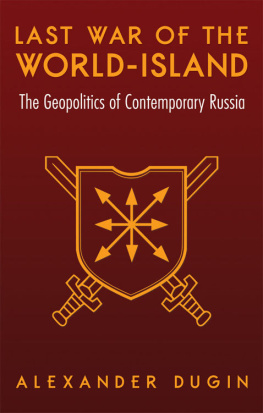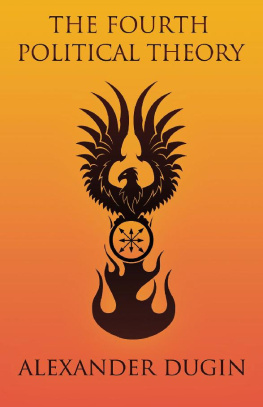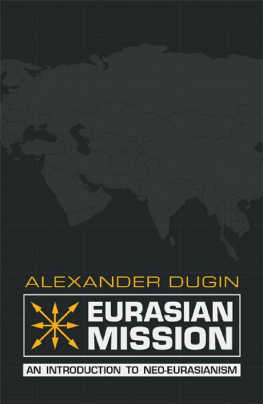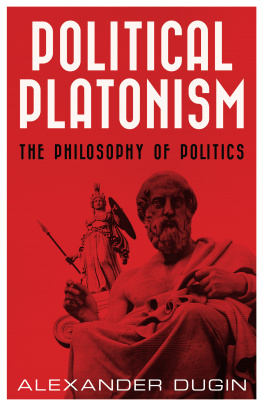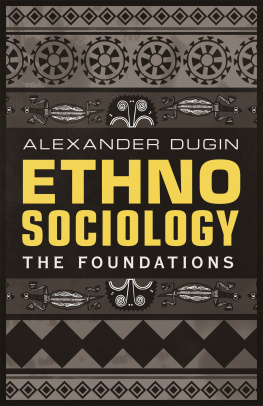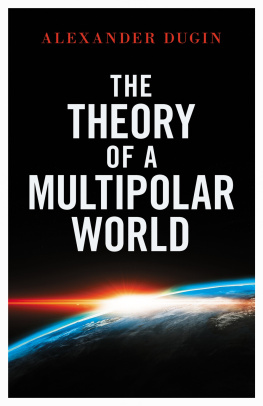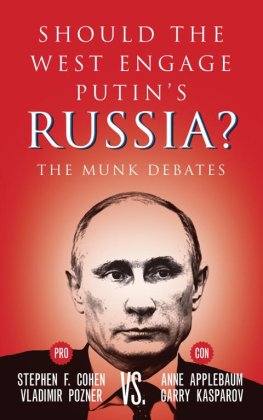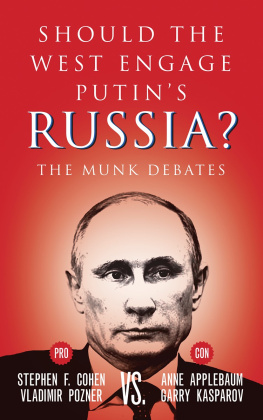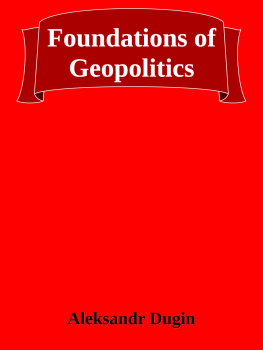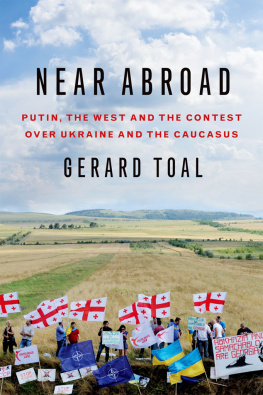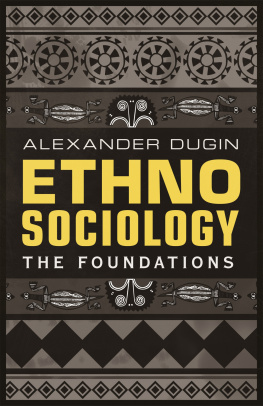Copyright 2015 by Arktos Media Ltd.
All rights reserved. No part of this book may be reproduced or utilised in any form or by any means (whether electronic or mechanical), including photocopying, recording or by any information storage and retrieval system, without permission in writing from the publisher.
First English edition published in 2015 by Arktos Media Ltd. (ISBN 978-1-910524-37-4), originally published as Geopolitika Rossii (Moscow: Gaudeamus, 2012).
John B. Morgan
ARKTOS MEDIA LTD.
This book was originally published in Russian in 2012. Although the geopolitical situation of Russia has changed considerably since then, especially as regards the Ukrainian crisis and the subsequent outbreak of war in eastern Ukraine, Alexander Dugin has made it clear that he stands by his original assessment and criticism of Putins approach, and that only by Russias assertion of itself as a land-based regional power in opposition to the sea-based Atlanticism of the United States and NATO can Russia survive in any genuine sense.
Footnotes that were added by me are denoted with an Ed. following them, and those that were added by the translator are denoted with Tr. Those which were part of the original Russian text have no notation. Where sources in other languages have been cited, I have attempted to replace them with existing English-language editions. Citations to works for which I could locate no translation are retained in their original language. Website addresses for on-line sources were verified as accurate and available during the period of April and May 2015.
John B. Morgan IV
Chapter I
Toward a Geopolitics of Russias Future
Theoretical Problems of the Creation of a Fully-Fledged Russian Geopolitics
The geopolitics of Russia is not the mere application of a geopolitical arsenal to the Russian government . In other words, Russian geopolitics cannot be created from without, as the simple, mechanical application of universal laws to a concrete and well-defined object. The problem is that a Russian geopolitics is possible only on the basis of a deep study of Russian society, both its present and its past. Before drawing conclusions about how the Russian government is correlated with territory, about territorial space have been insufficiently studied, and as a result this most important factor in the creation of a full-fledged Russian geopolitics is for the moment only available to us fragmentally and episodically.
Further, the question of the attitude of Russian society toward political forms and types of government remains open. If in the Marxist period we were guided by the theory of progress and the shifts of political-economic blocs, and considered the experience of the Western European countries as universal, then today this reductionist schema is no longer suitable. We must build a new model of Russian sociopolitical history, study the logic of that history, and propose structural generalities that reflect the peculiarities characteristic of our societys relations, at different historical stages, to other governmental and political systems. And in this case, alas, we have but a few relevant works, since Marxist theories yield notorious caricatures, based on exaggerations and violence against the historical facts and especially against their significance. The same is true of the application of liberal Western methods to Russian history and to Russian society.
These difficulties must not dishearten us. The intuitively obvious moments of Russian social history, observations about the peculiarities of Russian culture, and the very structure of the geopolitical discipline can be reference points for the movement toward the creation of a full-fledged Russian geopolitics. Such an approximate representation of Russian society will be enough to begin with.
Geopolitical Apperception
Classical geopolitics (both Anglo-Saxon and European) gives us some fundamental prompts for the construction of a Russian geopolitics. We can accept them unreservedly. However, in this case an important factor interferes, whose significance is great in non-classical physics (both for Einstein and for Bohr), but even more appreciable in geopolitics: the geopolitical system depends on the position of the observer and interpreter . It is not enough to agree with the geopolitical features that classical geopolitics attributes to Russia; we should accept those features and view our history and our culture as their confirmation. That is, we should grasp ourselves as products of that geopolitical system. In a word, we should understand ourselves not as a neutral observer, but as an observer embedded in a historical and spatial context. This procedure is usually called geopolitical apperception.
Geopolitical apperception is the ability to perceive the totality of geopolitical factors consciously, with an explicit understanding of both our subjective position and the regularities of the structure of what we perceive.
The notion of a Russian geopolitician does not signify only citizenship and a particular sphere of professional knowledge. It is something much deeper: a Russian geopolitician is an exponent of geopolitical views and the carrier of historical-social and strategic constants that are historically characteristic of Russian society (today, that of the Russian Federation). Geopolitics permits two global positions (Mackinder calls them the seamans point of view and the landsmans point of view). One cannot engage with geopolitics if one does not acknowledge these positions. He who occupies himself with it first clarifies his own position and its relation to the geopolitical map of the world. This position is neither geographical nor political (having to do with ones citizenship), but sociocultural, civilizational, and axiological. It touches the geopoliticians own identity . In certain cases, it can be changed, but this change is as serious as a change of ones religious confession or a radical modification of ones political opinions.
Heartland
Classical geopolitics proceeds from the fact that the territory of contemporary Russia, earlier the Soviet Union (USSR), and still earlier the Russian Empire, is the Heartland; it is the land-based (telluric) core of the entire Eurasian continent. Mackinder calls this zone the geographical pivot of history, from which the majority of telluric impulses historically issue (from the ancient steppe nomads like the Scythians and Sarmatians to the imperial center of Russian colonization in the sixteenth through the nineteenth centuries, or the Communist expansion during the Soviet period). Heartland which can become the heritage of the society placed on this territory. In this case it will be perceived and included in the social system and will ultimately express itself in political history. Historically, Russians did not immediately realize the significance of their location and only accepted the baton of tellurocracy after the Mongolian conquests of Ghengis Khan , whose empire was a model of tellurocracy.
But, beginning from the fifteenth century, Russia steadily and sequentially moved toward taking on the characteristics of the Heartland, which gradually led to the identification of Russian society with the civilization of Land, or tellurocracy. The Heartland is not characteristic of the culture of Eastern Slavs, but during their historical process, Russians found themselves in this position and adopted a land-based, continental civilizational mark.

